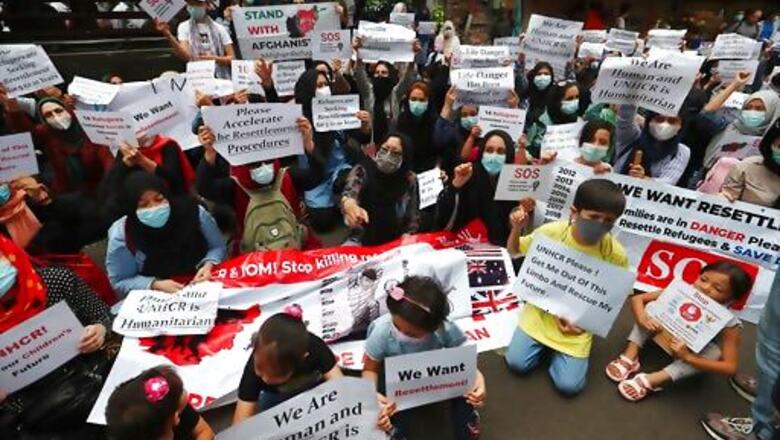
views
WASHINGTON: A coalition of organizations working to evacuate people who could be targeted by the Taliban rulers in Afghanistan appealed Monday for more assistance from the U.S. government and other nations as conditions deteriorate in the country.
Members of the AfghanEvac Coalition met in a video call with Secretary of State Antony Blinken to press the case for additional resources to help tens of thousands of people get out of Afghanistan, now faced with a deepening economic and humanitarian crisis in addition to a precarious security situation following the U.S. withdrawal.
Participants said afterward they were grateful for what the State Department has done so far, including helping to arrange a series of evacuation flights for U.S. citizens and residents since the withdrawal, but more will be needed in the months ahead.
The State Department doing enough isnt enough; we need whole of government solutions; we need the international community to step up and we need it quickly, said Peter Lucier, a former Marine who served in Afghanistan who works with coalition-member Team America. Winter is coming. There is a famine already.
Private organizations, particularly with ties to the veteran community, have played an important role in the evacuation and resettlement of tens of thousands of Afghans since the U.S. ended its longest war and the government fell to the Taliban. Members of the coalition have been working to help people get on the scarce flights out of the country and helping them get settled in communities once they reach the United States.
About 82,000 people have come to the U.S. so far under what the Biden administration calls Operation Allies Welcome. The Department of Homeland Security said 10% were American citizens or permanent residents.
The rest were a combination of people who had obtained special immigrant visas, for those who had worked for the U.S. government as interpreters or in some other capacity; people applying for one of the visas but who hadnt yet received it; or other Afghans who might be vulnerable under the Taliban, such as journalists or government officials, and qualified to come as refugees. Nearly half were children.
As of Monday, DHS said about 46,000 are still being housed at domestic U.S. military bases until they can be resettled by private refugee organizations around the country. Another 2,600 remain at overseas transit points, dubbed lily pads, as they undergo security vetting and health screening before coming to the U.S.
The AfghanEvac Coalition has urged the U.S. government to establish more of the lilly pads, and work with other nations to create more pathways for people to reach safety. It’s unclear how many people need to be evacuated but organizations have estimated the number conservatively in the tens of thousands. Aid agencies said about 300,000 have fled Afghanistan into Iran, including many members of Shiite communities seeking refuge from both the Taliban and attacks by the Islamic State affiliate in the country.
Lucier and Shawn VanDiver, a founder of the coalition, said without providing specifics that they raised specific stumbling blocks and choke points, that are preventing people from reaching safety in the U.S. or elsewhere. Both said it will require more time and input from other parts of the government to solve those problems.
The answers are complex, Lucier said. There are no simple technical fixes to a lot of this.
The meeting takes place against a backdrop of intense criticism by some Republicans in Congress, attacking a frantic evacuation, which was set in motion by President Donald Trump’s decision to sign a peace deal with the Taliban and set a withdrawal date, and for what they have alleged is insufficient vetting of refugees. They have also accused the administration of understating the number of American citizens left behind.
Republicans on the House Foreign Affairs Committee wrote Blinken on Monday seeking interviews with more than 30 State Department officials to address what they called the many unanswered questions about the planning or lack thereof that preceded the drawdown and evacuation. Those include the number of American citizens and residents still in Afghanistan and mechanisms for continued evacuations.
Blinken said Friday that the U.S. has offered the opportunity to leave Afghanistan to all American citizens and permanent residents it has identified as remaining in the country who wish to depart and have appropriate travel documents. Several hundred Americans are reported to still be in Afghanistan, though not all have indicated they want to leave, Biden administration officials have said.
The Gulf nation of Qatar has agreed to represent the United States in Taliban-run Afghanistan following the closure of the American Embassy in Kabul and will handle consular services for American citizens in Afghanistan and will deal with routine official communications between Washington and the Taliban government.
___
Associated Press writer Matthew Lee contributed to this report.
Disclaimer: This post has been auto-published from an agency feed without any modifications to the text and has not been reviewed by an editor
Read all the Latest Politics News here
















Comments
0 comment